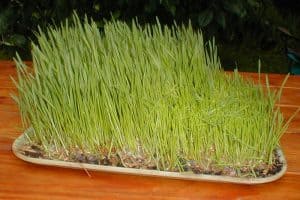Wheatgrass is a type of young grass or sprout from wheat grains. It is believed to be somewhat of a superfood and often used for juicing or in smoothies. Wheatgrass provides a concentrated amount of nutrients, including iron, calcium, magnesium, amino acids, chlorophyll, and vitamins A, C and E.
While wheatgrass is considered generally safe, Health experts at Mayo Clinic recommend pregnant women to avoid wheatgrass juice or smoothies as it carries risk of bacterial or mold infections similar to other sprouts as they are typically grown in moist soil and consumed raw. Wheatgrass supplements are also not recommended as some sources suggest that wheatgrass consumed in therapeutic amounts can act as a purgativr and may lead to miscarriage. Some sources suggest limiting wheatgrass intake to 2ounces during pregnancy to avoid the risk of miscarriage.
Also, those with wheat or grass allergy or gluten intolerance must avoid wheatgrass.
Bottom-line, since wheatgrass is a type of sprout, it is susceptible to bacterial growth and must be avoided raw. Due to lack to sufficient scientific research on the safety of wheatgrass during pregnancy, and the potential risk of miscarriage, it is better to avoid having wheatgrass juice or supplements when pregnant.
Read about eating other sprouts during pregnancy here:
Are sprouts such as bean sprouts, alfalfa sprouts, and wheat-grass healthy for pregnant women?
What should I take care of while eating brussels sprouts during pregnancy?
References:






